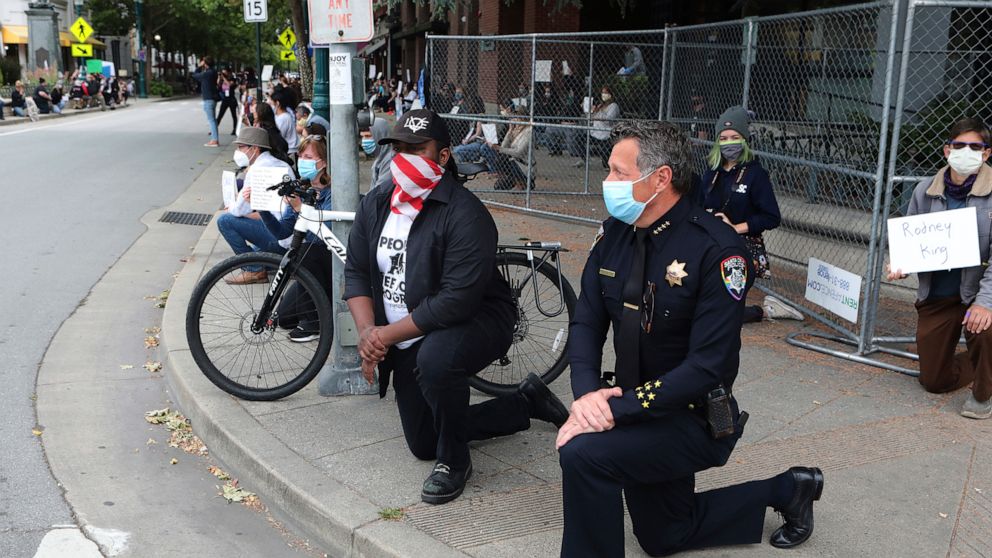Why some police officers stood with protesters outraged over George Floyd's death
As images of police officers in riot gear clashing with protesters in response to the death of George Floyd proliferated from across the country, a very different theme emerged from several cities.
Instead of lining up in opposition to the protesters, some police officers joined them.
"I never thought of anything else, to be honest," Camden County Police Chief Joseph Wysocki told ABC News.
For Camden, New Jersey, a city that had long been known for high crime rates, the police demonstrating alongside protesters in an ultimately peaceful event was not just a one-day phenomenon, but the continuation of years of efforts to bridge ties with residents since 2013, when the county police department took over public safety from the city's police agency.
"We were basically able to start a new beginning," Dan Keashen, communications director for Camden County, told ABC News. That new beginning included an emphasis on everyday community policing.
"It's a community, and we're part of the community. It's not us policing the city; it's us, together," Wysocki said.
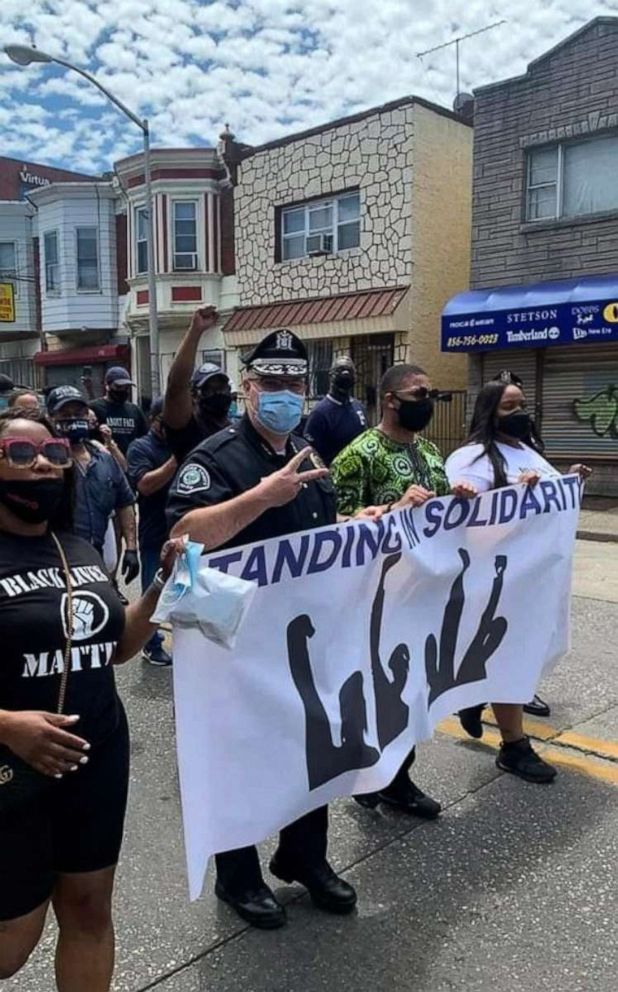
When officials in Camden learned plans for a demonstration were coming together, the police were able to get involved and join in because of the community ties they had made.
"I know that all cops aren't bad, so once I heard that they wanted to get involved, I was like, 'Sure, let's go for it, we can stand in solidarity,'" Yolanda Deaver, a local hair salon owner who organized the demonstration, told ABC News, adding that it was "really moving" to have officers as well as lawmakers standing behind her with shared beliefs about injustice.
"If you haven't been out in the community, if you haven't been working alongside residents and civic stakeholders, you're not going to have that credibility," Keashen said. "People know who the chief is; the chief has been in their church, the chief has been in their community center."
"They were like, 'This is your march, we're marching behind you, you lead the way,' and that's what we did," said Deaver, who added she's thinking of holding another demonstration given the success of this one.
Following the protests on Saturday, images of Wysocki walking with demonstrators, holding a banner reading, "standing in solidarity," spread across social media.
So, too, did images of police officers in Santa Cruz, California, Norfolk, Virginia, and other cities.
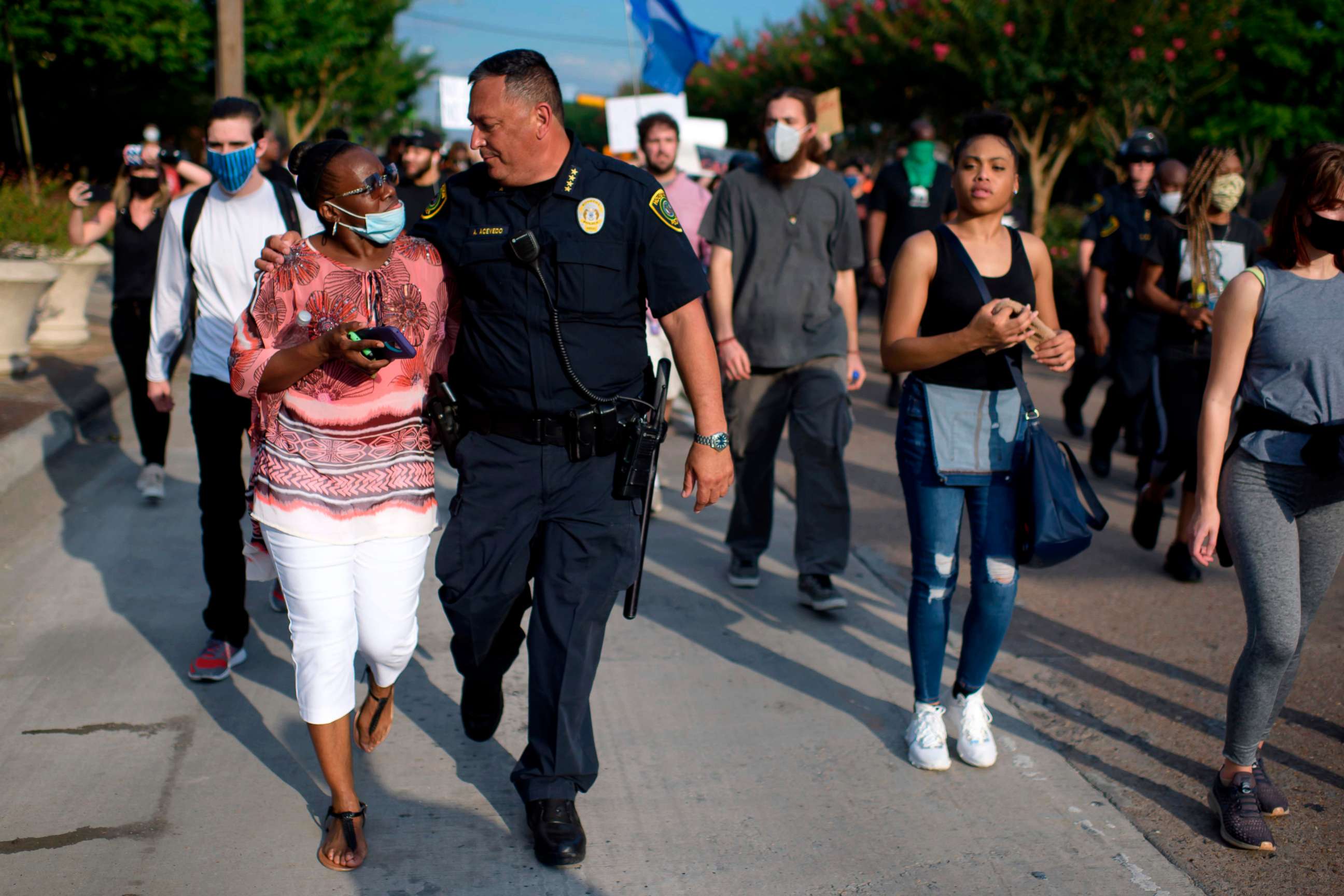
"SCPD is fully supportive of peaceful protests @CityofSantaCruz and we always keep them safe," the Santa Cruz Police Department tweeted. Police there were seen taking a knee alongside protesters in solidarity against the killings of unarmed black people.
Police Chief Andy Mills and Santa Cruz Mayor Justin Cummings were at that protest, which stayed peaceful, according to the Santa Cruz Sentinel.
"Our cops are smarter, more aware of personal bias, and are more willing to police justly than my generation," Mills wrote in an op-ed published Sunday. "Our new generation of Santa Cruz cops are more enlightened about race, and this will help to improve how we police."
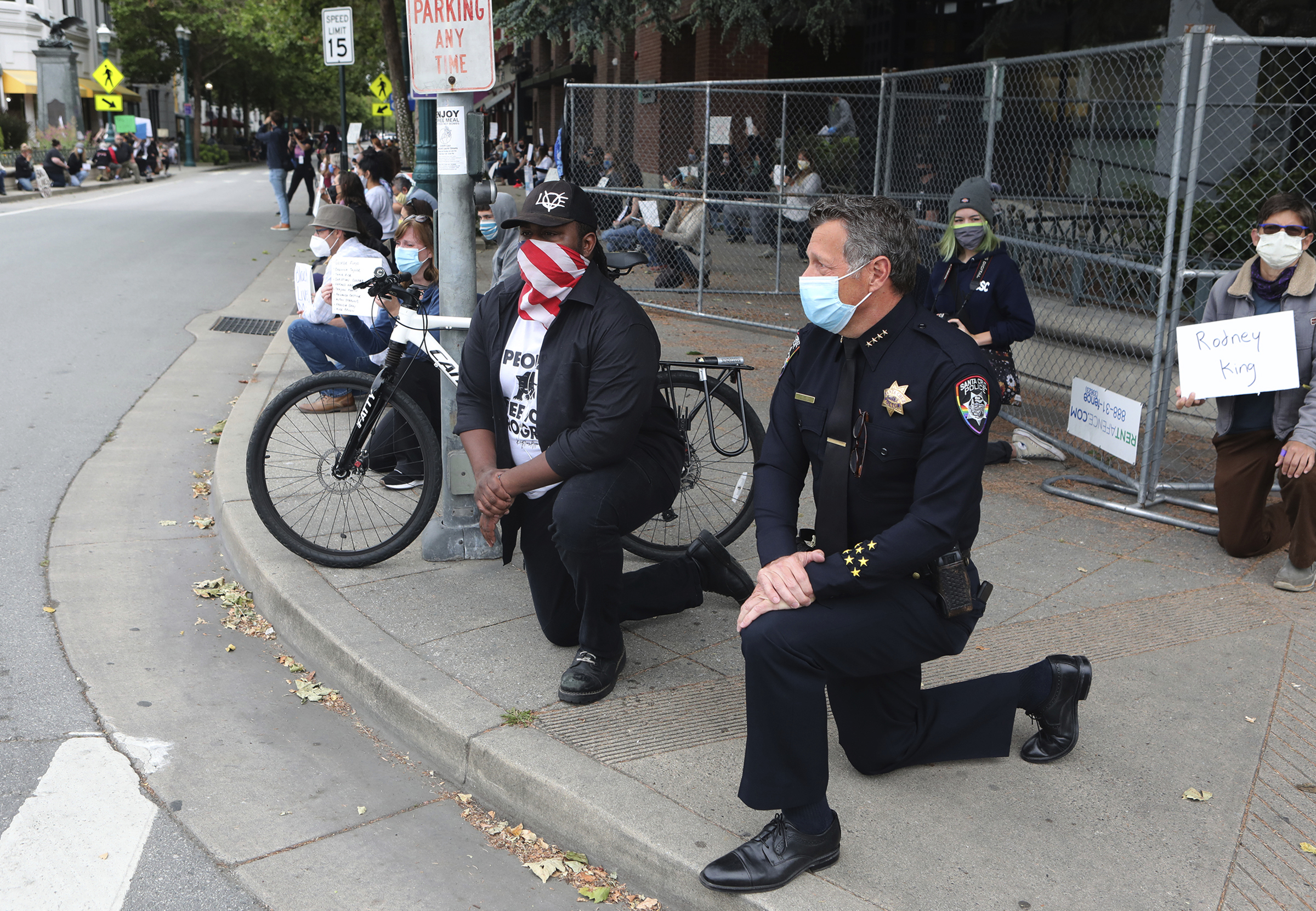
In Norfolk, Police Chief Larry Boone joined the protesters, carrying a sign that read, "Black Lives Matter," according to ABC affiliate WVEC.
In Flint, Michigan, protesters marched to the Flint Township Police Department, where they were met by cops in riot gear, according to MLive. But after conversations between protesters and police, the demonstrations remained peaceful.
"We want to be with y'all, for real," Genesee County Sheriff Chris Swanson said to cheers from demonstrators, with video from Mid-Michigan Now showing the sheriff taking off his helmet and laying it on the ground along with his baton. "So I took my helmet off, they laid their batons down. I want to make this a parade, not a protest."
"I knew that the benefit far outweighs the risk," Swanson told "Good Morning America" of the decision to take off the gear. "And when you show action of, 'Listen, I'm going to make myself vulnerable in order to come into your circle and show you that I want to be that solution,' that was the change maker right there."
He continued, "The community puts a lot of trust and faith in us, and we can't sit there and hold back -- we need to make sure we do what we need to do to hear the community and to respond."
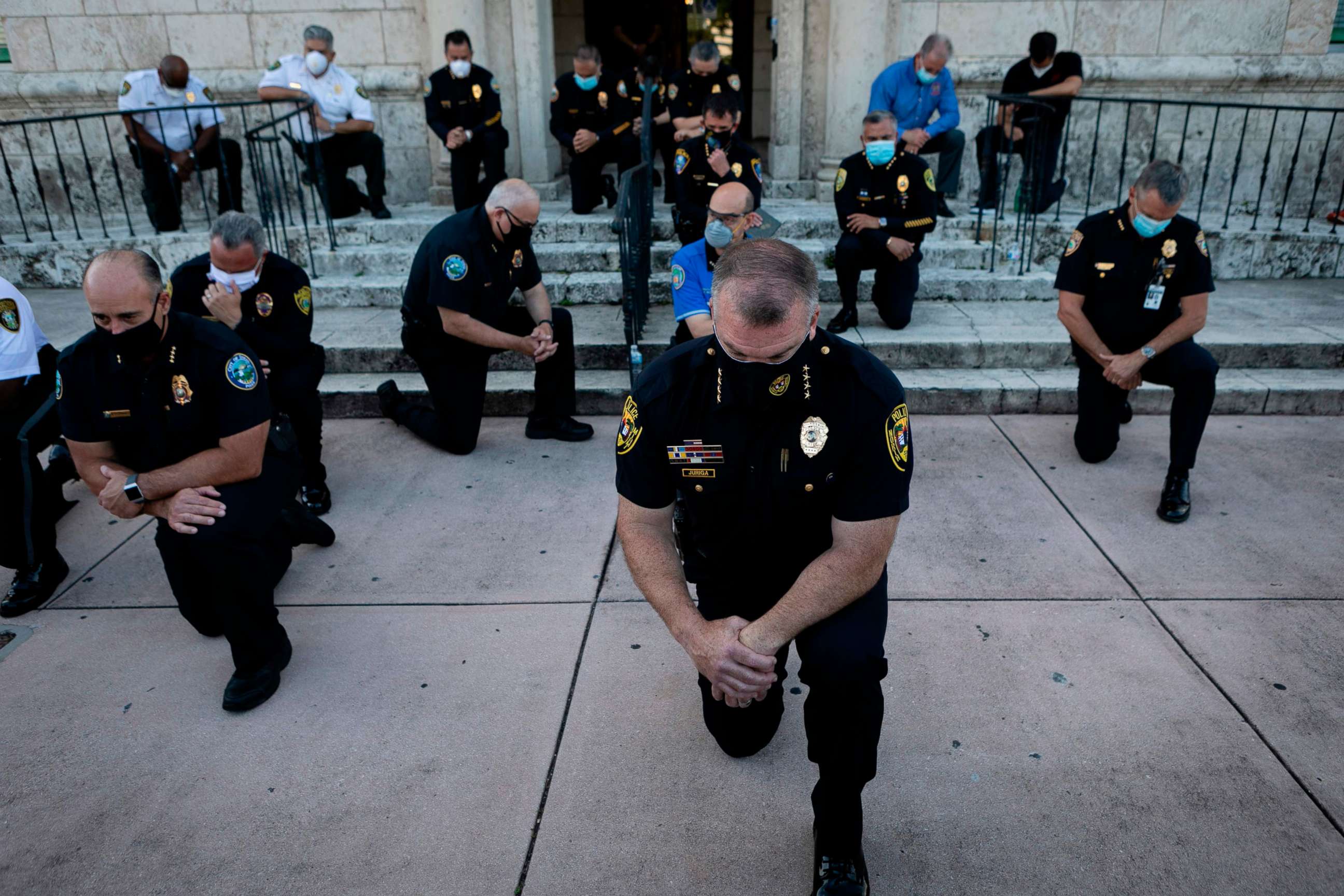
Across the river from Camden in Philadelphia, protests turned violent, with over 100 arrests by the end of Saturday night. But in Camden, the situation remained calm.
"Me marching with the protesters is a form of de-escalation, it's a partnership with the community," Wysocki said. "They have to see that I stand with them, and I do."
"Once the police officers said they feel the same way and they're walking with us, that's what made, I think, the crowd and everyone else feel comfortable," Deaver, the organizer, said. "The police that were there, they weren't standoffish. They weren't holding their batons, they didn't have their hands on their holster or their guns. They were standing down. They weren't agitating the crowd or anything; they let people speak, there was no pushing, no shoving or anything."
The protests, which were sparked after the death of Floyd, a black man who was pinned down by a white officer in Minneapolis on Monday, called for the end of police brutality against black people.
In Camden, part of the police's "new beginning" also included developing "a very progressive use-of-force policy" along with NYU School of Law's Policing Project, Wysocki said: "It mandates the sanctity of life. Force is a last resort. De-escalation is mandated."
"It's not just a policy," Wysocki said. "We train with it every day. It's constant reinforcement. You can have a perfect policy, but if you don't constantly train, it's forgotten."
There's no alternative. We can't impose our will on a community.
Excessive force complaints in Camden have seen a 95% drop since 2014, with just three complaints each in 2018 and 2019. Meanwhile, violent crime rates, too, have come down in the city.
At the conclusion of Saturday's demonstration, police held what they call a pop-up barbecue for residents, including hot dogs, hamburgers and a Mister Softee ice cream truck. Officers are doing more barbecues on Sunday, Wysocki said.
"There's no alternative. We can't impose our will on a community. It's the community and the police together, and that's what we're doing in Camden," Wysocki said.
